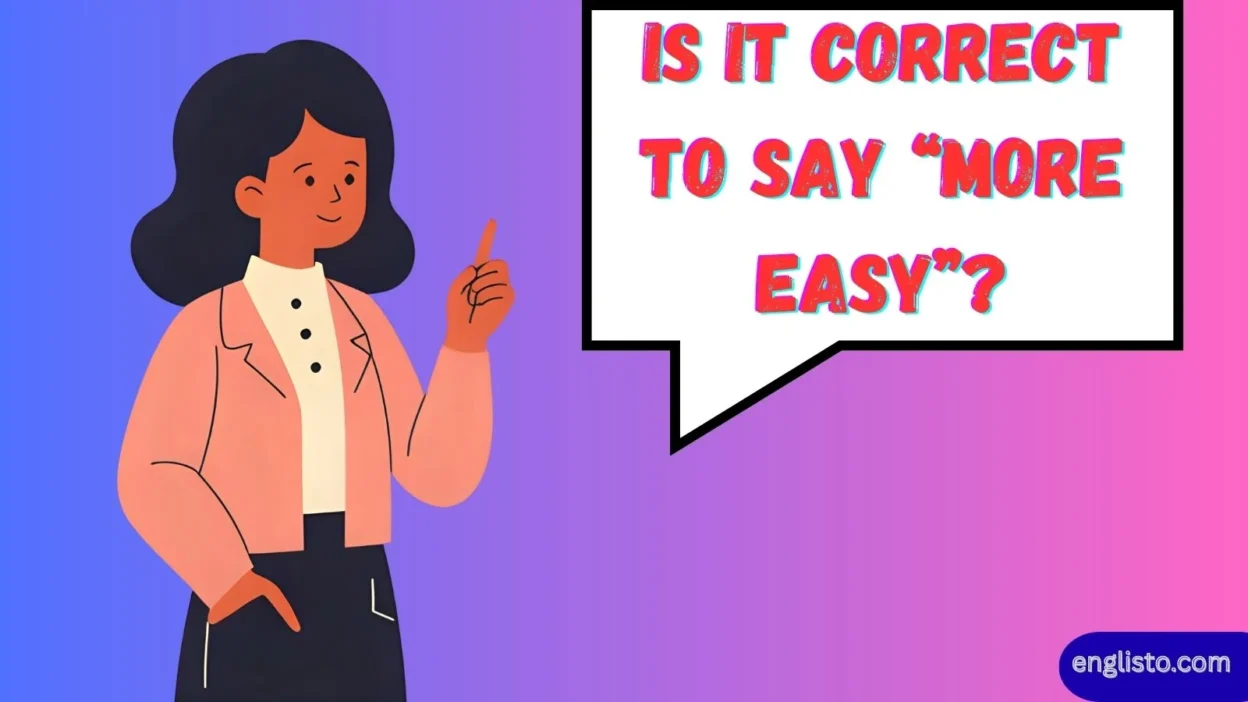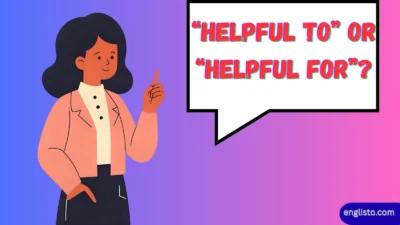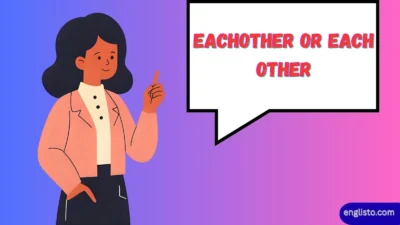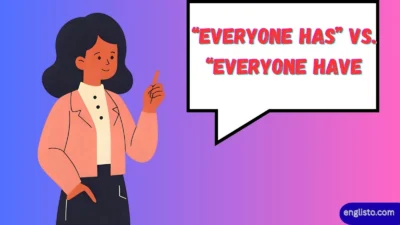If you’ve ever written or said the phrase “more easy”, you might have paused and wondered: “Is that actually correct?” Don’t worry—you’re not alone. English learners, and even native speakers, often get tripped up by comparative adjectives like easy and easier. Is It Correct to Say “More Easy”?.
The good news? You’re about to get a clear, detailed, and practical guide that not only answers the question but also helps you master when to use easier, more easy, or neither at all.
By the end of this article, you’ll understand:
- Why “easier” is usually the better choice.
- When “more easy” can be acceptable in casual or stylistic usage.
- How comparative adjectives work in English grammar.
- Real-life examples that make these rules stick.
Let’s break it down step by step.
Read More: Dwarfs or Dwarves – What’s the Difference?
Understanding Comparative Adjectives in English
Comparative adjectives help us compare two things, people, actions, or situations. They usually answer questions like: Which one is better? Which task is harder? Which movie is longer?
In English, we form comparatives in two main ways:
| Rule | Example | Explanation |
| Add -er to most one-syllable adjectives | tall → taller, small → smaller | Short words take the suffix -er. |
| Add more before longer adjectives (2+ syllables) | expensive → more expensive, difficult → more difficult | Multisyllabic words usually need more. |
So where does easy fit in?
It’s a two-syllable adjective ending in -y, and those usually change to -ier for the comparative form.
- easy → easier
- happy → happier
- funny → funnier
That’s why easier is the standard and grammatically correct form.
Is “More Easy” Grammatically Correct?
Technically, “more easy” is not incorrect. English speakers will understand you, but it sounds awkward, redundant, and non-standard.
- Correct: This test is easier than the last one.
- Awkward: This test is more easy than the last one.
Why? Because the suffix -er already implies comparison. Adding “more” creates unnecessary duplication.
Think of it this way: saying “more easy” is like saying “more easier.” Both feel heavy and unnatural to native speakers.
When Do People Use “More Easy”?
Even though easier is the correct form, you’ll still hear more easy sometimes. Here’s why:
1. Casual Speech & Emphasis
Some people use “more easy” to stress the degree of ease.
- “This way feels more easy on my legs.”
It’s not standard grammar, but the meaning comes across.
2. Stylistic or Poetic Choice
Writers, lyricists, and poets occasionally bend grammar rules for rhythm or style.
- “More easy than a summer breeze…” (poetic, not textbook grammar)
3. Non-Native Speaker Usage
Learners of English sometimes overgeneralize rules (e.g., using more with all adjectives). This is a common mistake in second-language writing.
4. Old or Dialectal English
In older English texts, you might stumble upon more easy. Language evolves, and what sounds odd today may have been more natural centuries ago.
Why “Easier” Is the Preferable Form
If you want to sound natural, clear, and correct, stick to it easier.
| Reason | Explanation |
| Grammatical Rule | Adjectives ending in -y usually change to -ier. |
| Standard English | “Easier” conforms to accepted grammar guides and dictionaries. |
| Native Speaker Preference | Most native speakers find “more easy” unnatural. |
| Clarity & Simplicity | Shorter, streamlined words reduce confusion. |
Remember the KISS method (Keep It Short and Simple). Easier is short, sweet, and widely understood.
Examples: Easier vs. More Easy in Real Sentences
| Sentence with “Easier” (Correct) | Sentence with “More Easy” (Awkward) |
| This math problem is easier than yesterday’s. | This math problem is more easy than yesterday’s. |
| Walking on a straight road is easier than climbing a mountain. | Walking on a straight road is more easy than climbing a mountain. |
| Cooking from scratch is easier with a good recipe. | Cooking from scratch is more easy with a good recipe. |
| GPS makes driving in a new city easier. | GPS makes driving in a new city more easy. |
| Playing piano is easier once you practice scales. | Playing piano is more easy once you practice scales. |
Common Grammar Mistakes Similar to “More Easy”
Learners often make parallel mistakes with other adjectives:
- more happier → happier
- more friendlier → friendlier
- more simpler → simpler
Tip: If the adjective is one or two syllables and ends in -y, it usually takes -ier instead of more.
Exceptions and Grey Areas
Of course, English loves exceptions. Some two-syllable adjectives can use either -er or more, depending on style.
| Adjective | Acceptable Comparatives | Example |
| clever | cleverer / more clever | She is cleverer (or more clever) than her brother. |
| quiet | quieter / more quiet | The library is quieter (or more quiet) than the park. |
| friendly | friendlier / more friendly | Our new neighbor is friendlier (or more friendly) than the old one. |
But with easy, almost everyone agrees: easier wins.
Real-Life Scenarios for Clarity
- Studying: Using flashcards is easier than rereading a whole book.
- Cooking: Heating frozen pizza is easier than baking bread from scratch.
- Traveling: Booking with a travel agent is easier than planning everything alone.
- Sports: Running a 5K is easier than climbing Mount Everest.
In all these contexts, easier flows naturally, while more easy would distract from the point.
Synonyms for “Easier” to Enrich Your Writing
Sometimes, avoiding repetition makes writing smoother. Instead of “easier,” you could use:
| Word | Context Example |
| simpler | This method is simpler and faster. |
| less difficult | Math became less difficult with practice. |
| more convenient | Online shopping is more convenient than going to a store. |
| less complicated | His explanation was less complicated than hers. |
| smoother | The new system makes the process smoother. |
How to Teach & Practice This Rule
If you’re learning English or teaching it, try these activities:
- Fill-in-the-blank:
- This job is ___ (easy/easier/more easy) than the last one.
- This job is ___ (easy/easier/more easy) than the last one.
- Rewriting exercises:
- Rewrite more easy sentences using easier.
- Rewrite more easy sentences using easier.
- Comparisons in real life:
- Compare weekdays vs. weekends: Weekends are easier because…
- Compare tasks: Copying is easier than retyping.
- Compare weekdays vs. weekends: Weekends are easier because…
Practice makes mastery, and soon easier will feel automatic.
Quick Takeaways
- Easier is the standard, correct form.
- More easy isn’t strictly wrong, but it’s awkward and best avoided.
- Comparative adjectives follow predictable grammar rules.
- Clarity, simplicity, and native speaker preference favor easier.
FAQs
Q1: Is “more easy” ever acceptable?
Yes, in casual speech, poetic writing, or older English, but easier is always preferable.
Q2: Why can we say “more friendly” but not “more easy”?
Some two-syllable adjectives allow flexibility (friendly/friendlier), but easy almost always takes easier.
Q3: Is “more easier” correct?
No. That’s redundant and grammatically incorrect.
Q4: Do native speakers ever say “more easy”?
Rarely, and usually for emphasis or in informal conversation. Most prefer easier.
Q5: How can I remember when to use -er vs. more?
- 1 syllable → -er (big → bigger)
- 2 syllables ending in -y → -ier (easy → easier)
- 2+ syllables → more (difficult → more difficult)
Conclusion
So, is it correct to say “more easy”? The answer: not really. While it’s understandable, it’s not the standard form and sounds unnatural to most English speakers. The correct comparative adjective is easier.
By understanding how comparatives work, you’ll avoid common grammar pitfalls and communicate more clearly. Whether you’re writing essays, chatting casually, or polishing professional documents, sticking with easier keeps your language accurate, natural, and effective.
In short: when in doubt, keep it easy—no, easier!



